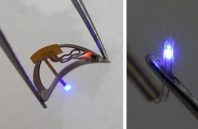This year’s Nobel Prize in Physiology or Medicine went to two pioneers of cancer immunotherapy, James P. Allison of the M.D. Anderson Cancer Center, USA, and Tasuku Honjo, Kyoto University, Japan. The laureates received their award for their groundbreaking work in “checkpoint” immunotherapy—work that, according to the Nobel Committee, opened an entirely new pathway for treatment of a variety of cancers that heretofore have stubbornly resisted other therapies.
That new pathway could, at least partly, be marked with light. A number of researchers in the past several years have looked at how the techniques of optogenetics, a discipline usually associated with neuroscience, might be used to tune and improve the effectiveness of the cancer immunotherapies whose pioneers were honored this year in Stockholm.

 (585) 768-2513
(585) 768-2513

